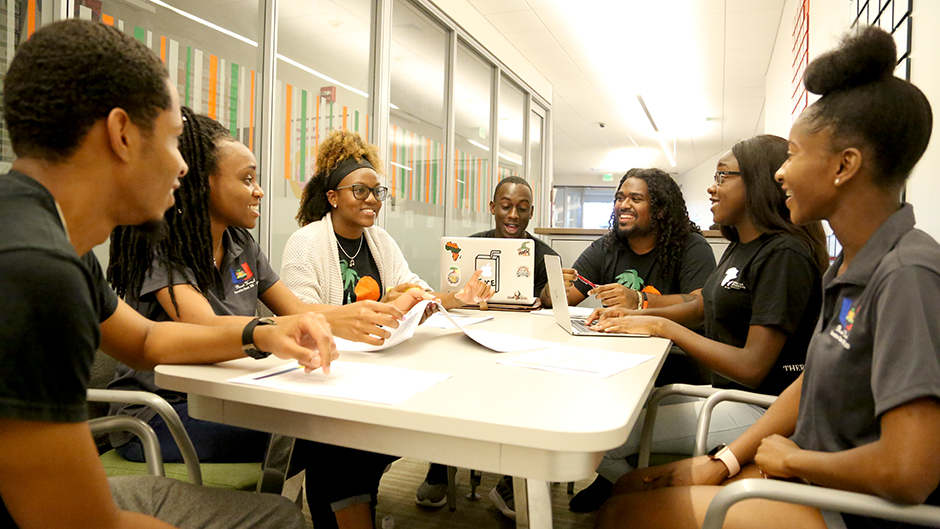When the Student Center Complex Advisory Council (SCCAC) reviewed the more than 40 applications it received this year for only 13 available offices within the Donna E. Shalala Student Center’s Student Organization Suite, this student-led committee faced no small feat in determining which organizations would be granted space. But out of this challenging endeavor arose an opportunity for collaboration and an enhanced sense of belonging.
Initially, the African Students Union (ASU), Caribbean Students Association (CSA) and Planet Kreyol each submitted separate applications to vie for space within the suite located on the second floor of the Shalala Center. But with limited offices available, the SCCAC was unable to grant each of the organizations its own space. Rather than turning two of the groups away, the advisory council recognized an opportunity for collaboration – rather than competition – among the three organizations.
“As we reviewed their applications, the SCCAC recognized the needs of each group and appreciated their demonstrated impact to the University of Miami community,” said Daniel Borges, a graduating senior and outgoing chair of the SCCAC. “So after several thoughtful deliberations, we saw a great opportunity to accommodate all three organizations by creating a shared cultural space to promote collaboration and discussion while celebrating the individuality of each organization’s identity.”
Renee Dickens Callan, current director of Multicultural Student Affairs and incoming executive director of Student Life, agrees and looks forward to working with these student organizations on their new joint ventures. She said, “I am impressed with how quickly these organizations came together in order to advance their educational and culturally relevant programming. The shared space will allow these groups to focus on their own organization’s goals as well as create a collective community among the groups' members.”
ASU, an organization committed to celebrating the cherished and diverse cultures and traditions found throughout the continent of Africa, hosts immersive programming, forums, teaching workshops and large-scale events on campus. Its outgoing president and UM senior Obianeze Okolo feels a sense of ease knowing that his organization will have a stable home on campus.
“It is so reassuring to know that we now have a central hub to commune as an organization for years to come,” said Okolo. “And our shared space will facilitate new and interesting discussions which will bring about new ideas for programming in the years to come.”
Planet Kreyol, which aims to represent and unite Haitian students at the University of Miami by promoting and coordinating cultural and social activities, has also had difficulties finding adequate meeting space on campus.
Christina Valcin, a graduating senior and outgoing president of Planet Kreyol, said, “We are excited to have a space where we can hold meetings rather than searching for empty seats in the University Center second-floor lounge and hoping we get lucky.”
Jheanelle Miller, a fourth-year architecture student and incoming president of CSA, is hopeful that this new space will allow CSA and the other organizations within the office to grow each organization’s footprint on campus while also introducing the student body to cultures they may not know much about.
“CSA is a multicultural organization that represents all people of Caribbean heritage, but we have also always been accepting to students of all ethnicities and backgrounds who are curious to learn more about our culture,” Miller said. “So sharing a space with ASU and Planet Kreyol will be a great opportunity to further cultural exchange and collaboration.”
This is not the first time the SCCAC has allocated shared office space to two or more student organizations. Three years ago, the committee established the Political Suite to provide a joint space for the College Republicans and College Democrats as well as the Asian Student Organization Suite which is home to the Indian Student Association, Chinese Student Scholars Association, Filipino Student Association and the Asian American Student Association.
“The Student Organization Suite is more than just office space; for many students and organizations, it feels like home,” Borges added. “Many students spend the majority of their day in the org suite, fostering lifelong friendships adding to the vibrancy of campus life.”
In addition to allocating office space, the SCCAC, which was created as the result of a student referendum in 2006, serves as a student-led advisory group to the complex’s Executive Director when setting a variety of policies and procedures, allocates storage space to student organizations annually, and reviews any special event requests within the SCC.

